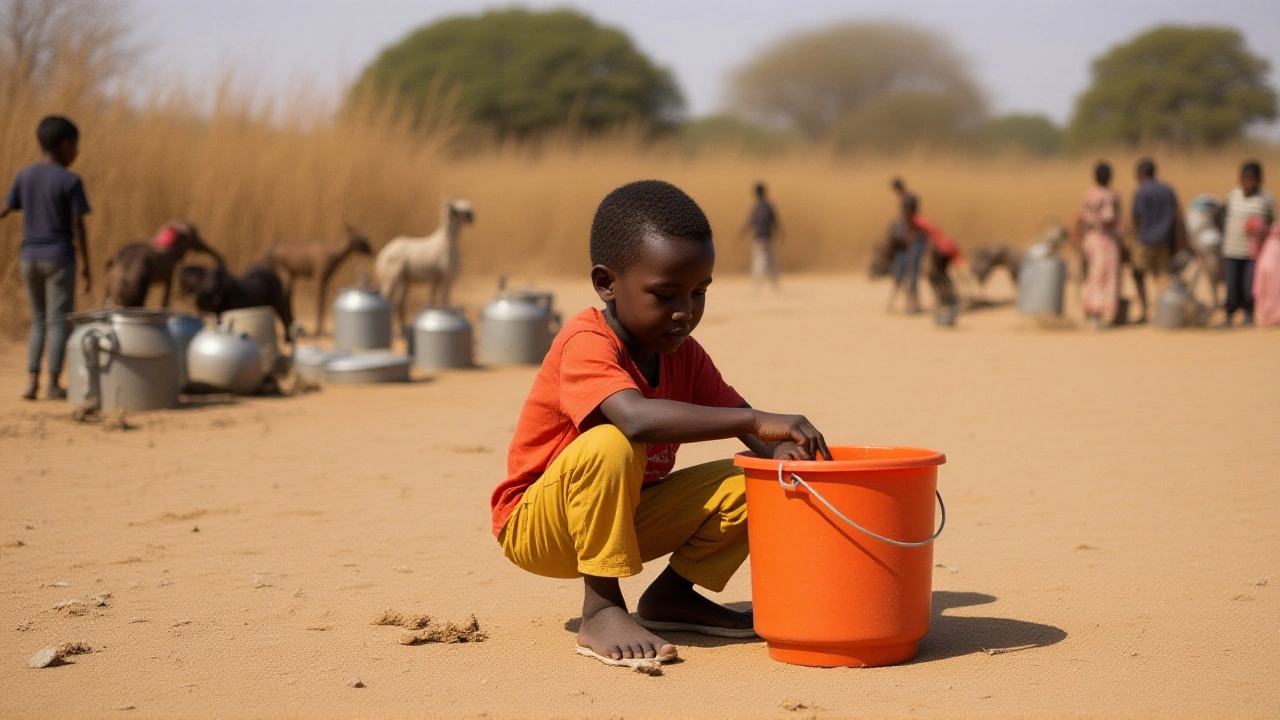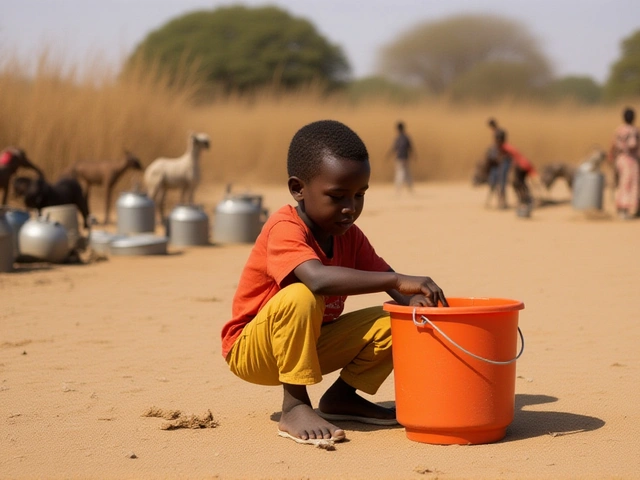The fall of El Fasher wasn’t just another battlefield loss — it was the end of an era. On October 26, 2025, the Rapid Support Forces (RSF) captured the last major urban center still held by the Sudanese Armed Forces (SAF) in Darfur, triggering what the United Nations called a "catastrophic turning point" in Sudan’s war. Just four days later, on October 30, 2025, Martha Ama Akyaa Pobee, the Assistant Secretary-General for Africa at the United Nations Department of Political and Peacebuilding Affairs, laid bare the human and strategic devastation in a 47-minute briefing to the United Nations Headquarters in New York City. The numbers didn’t just shock — they screamed. Over 1,800 civilians dead. Nearly 4,500 injured. More than 327,000 newly displaced. And with the city’s hospitals reduced to rubble, the survivors are now facing famine, sexual violence, and a future with no safety net.
The Final Siege: How El Fasher Fell
El Fasher had survived three previous RSF assaults — in January, May, and August of 2024 — each repelled by SAF reinforcements flown in from Khartoum. But on October 1, 2025, everything changed. The RSF, under the command of Mohamed Hamdan Dagalo (known as Hemedti), seized the Al-Fula airfield, 75 kilometers northeast of the city. That single move cut off the SAF’s last lifeline: ammunition, medicine, and evacuation routes. Without it, the 14-month siege collapsed in just 25 days. The final assault involved 4,500 RSF fighters, 120 armored vehicles, and 30 artillery pieces. The SAF, led by General Abdel Fattah al-Burhan, was outgunned, outmaneuvered, and out of options.Humanitarian Catastrophe Unfolds
The human cost is staggering. According to the Sudanese Doctors’ Union, 89% of El Fasher’s health facilities were destroyed. The United Nations Office for the Coordination of Humanitarian Affairs (OCHA) confirmed 327,000 people fled the city in the final week alone. With 93% of the pre-war population of 550,000 already gone, an estimated 412,000 now huddle in makeshift camps near the Chad border. Child malnutrition rates there hit 32.7% — nearly double the WHO’s emergency threshold. Meanwhile, the World Food Programme reported 24.3 million Sudanese face acute food insecurity, with famine officially confirmed in six Darfur localities as of October 25, 2025.And then there’s the sexual violence. The UN High Commissioner for Human Rights, Volker Türk, documented 478 cases in El Fasher during the siege — 92% of them attributed to RSF fighters. On October 28, International Criminal Court Prosecutor Karim Khan announced expedited arrest warrants for RSF commanders involved in these crimes. This isn’t chaos. It’s calculated terror.
The Vacuum: No Peacekeepers, No Hope
Here’s the brutal truth: there’s no one left to protect civilians. The African Union-United Nations Hybrid Operation in Darfur (UNAMID) ended its mandate on December 31, 2024. The United Nations Integrated Transition Assistance Mission in Sudan (UNITAMS) suspended all operations in Darfur on October 27, 2025, relocating 287 international staff to Juba, South Sudan. No peacekeepers. No monitors. No humanitarian access. Just a desert of silence.And the RSF? They now control 97.3% of Darfur’s territory — all five states. The SAF clings to a handful of garrisons in South Kordofan, isolated and starving. The economy? The Sudanese pound has lost 47.8% of its value against the dollar in October alone, trading at 1,843 to the dollar on the black market. Formal banking operations have shrunk by 92%. This isn’t just a war — it’s the collapse of a state.
Diplomacy Failed. Sanctions Are Next
The Jeddah talks on October 15–18, 2025, collapsed after the RSF demanded 65% of cabinet seats — a non-starter for the SAF. With diplomacy dead, the Security Council is moving to punish. On November 3, 2025, it will vote on Resolution S/2025/1030, imposing asset freezes and travel bans on 17 commanders — including Hemedti and al-Burhan. Will it work? Maybe. But sanctions alone won’t stop the flow of weapons or the march of tanks. What’s needed is enforcement. And right now, there’s none.What Comes Next?
Martha Ama Akyaa Pobee didn’t mince words: "Without immediate ceasefire enforcement, we anticipate 1.2 million additional displacements from Darfur by December 31, 2025, bringing the total displaced to 11.7 million out of Sudan’s pre-war population of 48.5 million." That’s nearly a quarter of the entire country on the move. Where will they go? What will they eat? Who will protect them?The world has watched as Syria, Yemen, and now Sudan unravel. Each time, we say "never again." But when the numbers hit this scale — when children are starving by the tens of thousands, when hospitals are bombed, when the UN pulls out — what does "never again" even mean anymore?
Frequently Asked Questions
Why did El Fasher fall when previous RSF attacks failed?
El Fasher survived three earlier RSF offensives because the SAF could airlift reinforcements and supplies via the Al-Fula airfield. But when the RSF captured that airfield on October 1, 2025, they cut the last supply line. Without ammunition, medical aid, or evacuation routes, SAF defenses collapsed within weeks — despite holding out for 14 months.
How many people are now at risk of famine in Sudan?
The World Food Programme reports 24.3 million Sudanese face acute food insecurity as of October 2025. Famine conditions have been confirmed in six Darfur localities, with child malnutrition rates in Chad-border camps reaching 32.7% — nearly double the WHO emergency threshold. Without urgent aid, millions more will starve before year’s end.
What happened to UN peacekeeping in Darfur?
UNAMID, the AU-UN hybrid mission, ended its mandate on December 31, 2024. UNITAMS suspended all Darfur operations on October 27, 2025, relocating 287 staff to Juba. There are now zero UN peacekeepers on the ground in Darfur — the first time since 2003. Civilians are completely unprotected.
What’s the significance of the November 3 Security Council vote?
Resolution S/2025/1030 targets 17 commanders from both the RSF and SAF, including Hemedti and al-Burhan, with asset freezes and travel bans. While symbolic, it’s the first concrete legal step since the war began. But without enforcement mechanisms — like a no-fly zone or arms embargo — its impact may be limited to financial pressure, not battlefield change.
Why is the RSF so dominant in Darfur now?
The RSF controls 97.3% of Darfur’s territory because it has better logistics, foreign backing, and a decentralized command structure. The SAF, once the national army, is now fragmented, under-resourced, and reliant on dwindling air support. The RSF also benefits from tribal alliances and looting of state resources — turning war into a profitable enterprise.
Can this conflict be stopped before 11.7 million are displaced?
Only with immediate, enforced ceasefire and massive humanitarian access. The UN’s projection of 11.7 million displaced by December 31, 2025, assumes no intervention. Regional powers like Egypt, Ethiopia, and Qatar hold influence over both sides. But without unified international pressure — and real consequences for violations — the war will continue to devour lives.



So the UN pulls out and suddenly we’re shocked? We’ve been watching this trainwreck for two years. At this point, it’s not a humanitarian crisis - it’s a spectator sport for global powers with better things to do.
The collapse of El Fasher is not merely a military defeat; it is the logical culmination of a post-colonial state architecture that never possessed legitimate sovereignty. The SAF and RSF are not opposing factions - they are twin manifestations of a failed polity, each armed by external interests and sustained by the corpse of national identity.
Why is it always Africa? We send aid, we send statements, we send UN officials in suits who fly out before the bodies are cold. Meanwhile, our own border towns are falling apart - why are we spending billions on a country that can’t even govern itself?
It’s worth noting that the RSF’s dominance isn’t just tactical - it’s systemic. They’ve weaponized tribal patronage, black-market fuel, and looted state assets to create a self-sustaining conflict economy. The SAF, by contrast, is still operating under the delusion that it’s a national army rather than a dying militia with a flag.
Imagine if this was happening in Ukraine. Imagine if the UN pulled out of Kyiv. Imagine if 400k people fled to Poland and the world just… shrugged. We don’t do that to white people. We don’t. We send jets. We send tanks. We send CNN crews with tearful interviews. But Sudan? Eh. Let them figure it out.
I’ve been following this for months and I just want to say - the numbers are horrifying, sure, but what really breaks my heart is the silence. No one’s talking about the mothers who carried their kids for 100 miles to Chad with nothing but a blanket and a bottle of water. No one’s talking about the doctors who kept working in bombed-out clinics with no anesthesia, no antibiotics, no hope. This isn’t just a war - it’s a slow-motion genocide that the world decided to mute.
So sad to see this happen… the UN really should’ve stayed longer… I hope they can get help to those kids… 😔
I just want to say, we all need to remember that behind every number - 327,000 displaced, 1,800 dead - there’s a person. A child who used to draw on the walls. A grandmother who baked bread for neighbors. A teacher who taught kids how to read under a tree. We’re not just talking about statistics here. We’re talking about human beings who had names, dreams, and families. And now? They’re just names on a spreadsheet. That’s the real tragedy.
The structural decay here is terminal. The RSF functions as a predatory rentier state embedded within a non-state actor framework - a proto-fascist kleptocracy with tribal legitimization. Meanwhile, the SAF’s legitimacy has been hollowed out by years of institutional rot, rendering it incapable of anything beyond symbolic resistance. The international community’s reliance on sanctions as a policy tool is not just inadequate - it’s performative. Without coercive enforcement, it’s just digital posturing.
Wow. Just… wow.
Let’s be honest - this is what happens when you let militias become armies. The RSF isn’t even a proper military. They’re armed gangs with uniforms. And yet, they’ve outmaneuvered a national army that was supposed to be trained, equipped, and supported by decades of Western investment. Where’s the accountability? Where’s the shame?
I just can’t sleep knowing kids are starving right now. Like, I opened my fridge and there’s leftover pizza. And I just… cried. This is so unfair.
My heart is with the people of El Fasher. I’ve been sending donations to the Red Cross - if you can, please do too. We can’t let them disappear into the silence.
This is why we need African solutions for African problems. Why are we waiting for the UN or the US to save us? We have the brains, the will, the resources - but we’re too busy pointing fingers. Nigeria could’ve led a regional force years ago. We didn’t. Now look.
So Hemedti’s gonna be on the UN’s naughty list? Cool. What’s next? A tweet? A meme? A TikTok challenge? I’m waiting for the hashtag #FreeHemedti to trend before the vote.
It’s strange how we treat war like a TV show. We binge the headlines, feel bad for a week, then move on to the next disaster. But this? This isn’t a plot twist. This is real life. And the people in El Fasher didn’t sign up for this ending.
Let’s not pretend the SAF is innocent. They bombed civilians in Khartoum. They used starvation as a weapon. This isn’t a battle between good and evil - it’s a battle between two brutal regimes, both funded by foreign actors, both equally guilty. Sanctioning both is the only moral position.
Yeah, the world’s a mess. But honestly? We’ve known this was coming since 2019. We just didn’t want to look. Now the bodies are piling up and we’re all acting like we didn’t see it coming. I’m tired of pretending we’re shocked. We’re just lazy.